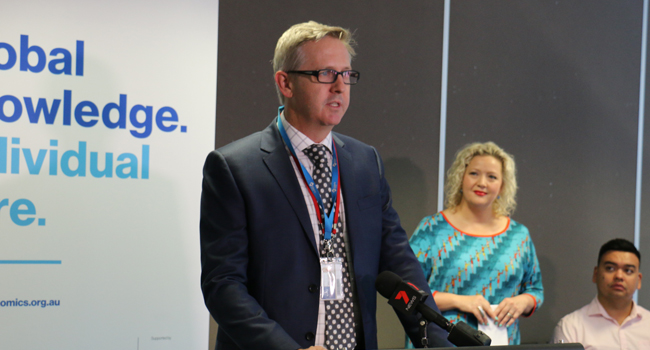30 Mar 2017
Better diagnosis for patients with improved superbug protection: more genomic sequencing in Victoria
Victorian Health Minister, The Hon Jill Hennessy, today announced the five disease areas in which selected patients will receive genomic sequencing through the Melbourne Genomics Health Alliance during 2017 to 2019. The announcement was made at Austin Health, which is co-leading two of the five cross-institution projects with the Doherty Institute.
Genomic sequencing will be made available to patients with specific medical conditions over the next two years, alongside their usual care – to assess the usefulness of genomics in medical practice.
Patients at The Royal Melbourne Hospital, The Royal Children’s Hospital, The Peter MacCallum Cancer Centre, Austin Health and Monash Health will be invited to participate, to determine whether genomic sequencing can provide:
- better identification and control of superbugs among Victoria’s most vulnerable patients
- better understanding of the cause of a patient’s bone marrow failure, enabling more personalised medical care and improved identification of relatives at risk
- improved diagnosis and care of adolescent and adult patients with complex neurological and neurodegenerative disease
- better understanding of the cause of multiple abnormalities babies who die in utero or early in infancy
- more accurate diagnosis and improved patient care for genetic kidney disease
“Already, the Alliance has had national and international impact in demonstrating how genomic sequencing can be delivered within healthcare, and how it can benefit patients through quicker, more accurate diagnosis, often reducing the need for more invasive or expensive testing,” said Melbourne Genomics’ Executive Director, Associate Professor Clara Gaff.
“These new projects will give an even clearer perspective on how genomics can improve patient care – from infancy to old age. By the end of 2019, we will understand the impact of genomics on diagnosis and care across 16 disease areas. And Victorians will benefit from the systems and the professional knowledge we are building to support genomic medicine in practice.”
“Tracking superbugs in real-time across multiple hospitals, should enable us to better identify where they are, how they are being transmitted and what we can do to prevent this,” said University of Melbourne Professor Ben Howden, Director of the Microbiological Diagnostic Unit (MDU) Public Health Laboratory at the Doherty Institute and co-leader of the project.
"This project will develop a new library of genomic data on superbugs in Victoria. Data that can inform healthcare services and government. Data that can become a research tool in the development of new drugs and new diagnostic tests for superbugs.”
Melbourne Genomics Health Alliance is funded by the Victorian Government and the 10 Alliance members.
Genomics is a rapidly advancing field, which examines an individual’s complete set of genetic information (the genome) to identify changes (variants) that may impact on health. Genomics offers enormous potential to improve diagnosis and provide more personalised medical care.

Professor Ben Howden talks about the importance of using genomic sequencing to fight superbugs.


